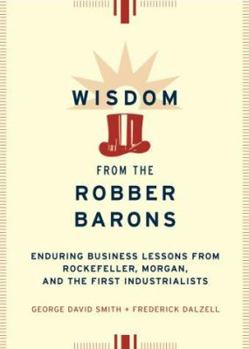Wisdom from the Robber Barons: Enduring Lessons from Rockefeller, Morgan, and the First Industrialists
Select Format
Select Condition 
Book Overview
At the turn of the last century, the men who dared to think big changed the business landscape forever--and grew fabulously wealthy in the process. Today, as the forces of technological and social... This description may be from another edition of this product.
Format:Hardcover
Language:English
ISBN:0738203726
ISBN13:9780738203720
Release Date:January 2000
Publisher:Basic Books (AZ)
Length:160 Pages
Weight:0.60 lbs.
Dimensions:0.7" x 5.3" x 8.3"
Customer Reviews
2 ratings
Would you really want to be rich,powerful and famous?
Published by Thriftbooks.com User , 17 years ago
This is an excellent little book that shows what it takes to be rich,powerful and famous.I just did a review on "The Secret",July 16,2007;which tells you the secret to success by basically wishing for it. This book,though put together by academics,shows what these "Barons" believed were the ingredients in their success. This book reminds me of a Special Walter Cronkite did over 25 years ago.He had 4 highly successful entreprenneurs ;Land,who invented the Polaroid,Getty,of oil fame,and two others who I can't recall). He also had 4 young men who were completing their University courses.The Barons told the students what it took them to attain the successes they had.They were going to give each student $1,000 (more than any of them had when they started) and armed with "the secrets to success" set them on their way to becoming asrich,powerful and famous as they did. As the barons explained what they did,the sacrifices they made,the discipline it took,the obsession to succeed and all that went with it;it was clear that the students,though intent in the beginning,weren't sure they really wanted to buy into it all.The barons also were convinced that the students didn't really want to be rich,powerful and famous;they only wanted the things they thought went along with it. So,as you read this book you see that the money and fame was way down the list of what these highly successful people were after.The money and fame was simply a by-product and at the most ,only a tool to further their dreams. As for the riches,they usually lost it in the end or gave it away.It was filling their dream that was important. As I write this,we have two great examples in the news here in Toronto. Ed Mervish,from humble beginnings,made millions in the low cost retail business and later in the Arts and Entertainment.He loved his employes and they worshiped him. He loved his city and became one of its most admired citizens. Then there is Conrad Black,who came from a well to do background and created a huge empire,and now fighting to defend himself in court. Don't you not think that it was something other than just money that drove these two men;and is it any wonder why so few have what it takes to be rich,powerful and famous. If one has such desires ,the price is high and you better be brepared to pay it.
A Slender Volume of Abundant Value
Published by Thriftbooks.com User , 24 years ago
I really enjoyed reading this book, especially because there are so many quotations included which I had not encountered previously. Smith and Dalzell identify "enduring lessons from Rockefeller, Morgan, and [others among] the first industrialists." The term "Robber Barons" suggests criminal monarchs. No doubt it has some direct relevance to those discussed, at least at some point in their respective business careers. The material is organized as follows: an excellent Introduction ("Why Robber Barons Matter") followed by four chapters (Venturing, Competing, Managing, and Leading). Then there is a handy section called "Chronology: Business and World Events, 1870-1929,'" followed by recommendations for "Further Reading."Why do the Robber Barons matter? "During the golden age of industry, running from the midnineteenth century through 1930 or so, the Robber Barons commercialized risky high technologies and figured out how to build radically new organizations from the bottom up. They identified the great entrepreneurial and management issues of the world's first big corporations, and they devised surprisingly durable solutions to the basic business problems of modern civilization." Here are a few of the quotations which caught my eye:"There could be no progress until enough people could be made dissatisfied -- and this could be done only when they were brought to think beyond the limits to which they were accustomed." (Thomas Edison)"If you have an idea, that is good. If you also have ideas as to how to work it out, that is better." (Henry Ford)"Every executive has to recognize sooner or later that he himself cannot do everything that needs to be done. Until he recognizes this, he is only an individual, with an individual's power, but after he recognizes it, he becomes, for the first time, an executive, with control of multiple powers." (Alfred Sloan)The authors have done an excellent job of selecting and distributing quotations such as these throughout the text. They include their own insightful comments, correlating them with key points previously introduced in their Introduction. Is there a great deal that is "new" in this slender volume? No. Is there much of value to be learned or have reaffirmed? You bet.





